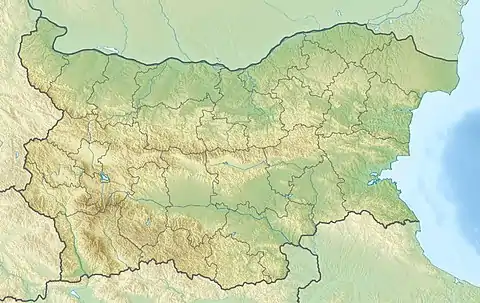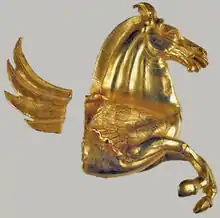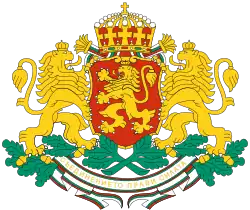Razgrad
Разград | |
|---|---|
 | |
 Flag  Coat of arms | |
 Razgrad Location of Razgrad | |
| Coordinates: 43°32′N 26°31′E / 43.533°N 26.517°E | |
| Country | Bulgaria |
| Province | Razgrad |
| Government | |
| • Mayor | Dencho Boyadzhiev (BSP) |
| Area | |
| • City | 92.845 km2 (35.848 sq mi) |
| Elevation | 270 m (890 ft) |
| Population (2015)[1] | |
| • City | 28,931 |
| • Density | 310/km2 (810/sq mi) |
| • Urban | 44,894 |
| Time zone | UTC+2 (EET) |
| • Summer (DST) | UTC+3 (EEST) |
| Postal Code | 7200 |
| Area code | 084 |
| Website | www |
Razgrad (Bulgarian: Разград [ˈrazɡrat]) is a city in Northeastern Bulgaria in the valley of the Beli Lom river that falls within the historical and geographical region of Ludogorie (Deliorman). It is an administrative center of Razgrad Province.
Etymology

The suffix "grad" means city in Bulgarian, while the origin and the meaning of the first part "raz" is obscure. During the Second Bulgarian Empire, around the present city there was a settlement, mentioned by the names of Hrasgrad, Hrazgrad and Hrizgrad'. These names come from the name of the Bulgar and Slavic god Hors.
History




Razgrad was built upon the ruins of the Ancient Roman town of Abritus on the banks of the Beli Lom river. Abritus was built on a Thracian settlement of the 4th-5th century BC of unknown name. Several bronze coins of the Thracian king Seuthes III (330-300 BC) and pottery were found, as well as artifacts from other rulers and a sacrificial altar of Hercules.
Some of Razgrad's landmarks include the Varosha architectural complex from the 19th century, the ethnographic museum and several other museums, the distinctive Razgrad clock tower in the centre built in 1864, the St Nicholas the Miracle Worker Church from 1860, the Momina cheshma sculpture, the Mausoleum Ossuary of the Liberators (1879–1880) and the Ibrahim Pasha Mosque from 1530. The mosque is said to be one of the largest in the Balkans.
In 251, the town was the site of the Battle of Abrittus, during which the Goths defeated a Roman army under the emperors Trajan Decius and Herennius Etruscus. The battle is notable for being the first occasion of a Roman emperor being killed in a battle with barbarians.
Razgrad Peak on Greenwich Island in the South Shetland Islands, Antarctica is named after Razgrad.
Population
In January 2012, Razgrad was inhabited by 33,416 people within the city limits, while the Razgrad Municipality with the legally affiliated adjacent villages had 50,457 inhabitants.[2] The number of the residents of the city (not the municipality) reached its peak in the period 1988-1991 when exceeded 55,000.[3] The following table presents the change of the population after 1887.
| Razgrad | |||||||||||||||
|---|---|---|---|---|---|---|---|---|---|---|---|---|---|---|---|
| Year | 1887 | 1910 | 1934 | 1946 | 1956 | 1965 | 1975 | 1985 | 1992 | 2001 | 2005 | 2009 | 2011 | 2021 | |
| Population | 11,752 | 13,957 | 15,421 | 15,010 | 18,389 | 26,398 | 42,609 | 49,582 | 40,906 | 38,948 | 35,932 | 34,592 | 33,880 | 28,931 | |
| Highest number 58,112 in 1991 | |||||||||||||||
| Sources: National Statistical Institute,[3][4][5] citypopulation.de,[6] pop-stat.mashke.org,[7] Bulgarian Academy of Sciences[8] | |||||||||||||||
Ethnic composition
According to the latest 2011 census data, the individuals declared their ethnic identity were distributed as follows:[9][10]
- Bulgarians: 24,701 (79.1%)
- Turks: 5,902 (18.9%)
- Roma: 288 (0.9%)
- Others: 140 (0.4%)
- Indefinable: 195 (0.6%)
- Undeclared: 2,654 (7.8%)
Total: 33,880
The Razgrad Province has the second largest Turkish population in Bulgaria behind the Kardzhali Province, though the municipality and the city of Razgrad have a lower proportion of Turks than the rest of the province.
Sport
Razgrad is widely recognizable for being home to the association football club Ludogorets Razgrad, who in recent years have become the dominant force in Bulgarian football after winning eleven consecutive Bulgarian First League titles between 2012 and 2023.[11] After reaching the UEFA Europa League round of 16 during the 2013–14 season, the club also made their UEFA Champions League debut appearance a season later. Ludogorets play their home matches at Ludogorets Arena, a venue with a capacity for 10,500 people.
Geography
Climate
| Climate data for Razgrad, Bulgaria (1991-2020), Station height: 334.9 | |||||||||||||
|---|---|---|---|---|---|---|---|---|---|---|---|---|---|
| Month | Jan | Feb | Mar | Apr | May | Jun | Jul | Aug | Sep | Oct | Nov | Dec | Year |
| Record high °C (°F) | 19.7 (67.5) |
23.7 (74.7) |
27.0 (80.6) |
30.6 (87.1) |
33.5 (92.3) |
38.0 (100.4) |
40.6 (105.1) |
38.7 (101.7) |
36.9 (98.4) |
34.5 (94.1) |
26.7 (80.1) |
20.5 (68.9) |
40.6 (105.1) |
| Mean daily maximum °C (°F) | 3.9 (39.0) |
6.5 (43.7) |
11.1 (52.0) |
16.9 (62.4) |
22.1 (71.8) |
25.9 (78.6) |
28.4 (83.1) |
28.7 (83.7) |
23.7 (74.7) |
17.6 (63.7) |
11.1 (52.0) |
5.4 (41.7) |
16.8 (62.2) |
| Daily mean °C (°F) | −1.1 (30.0) |
1.8 (35.2) |
5.8 (42.4) |
11.0 (51.8) |
16.2 (61.2) |
20.1 (68.2) |
22.4 (72.3) |
22.4 (72.3) |
17.5 (63.5) |
11.9 (53.4) |
6.5 (43.7) |
1.5 (34.7) |
11.3 (52.4) |
| Mean daily minimum °C (°F) | −3.2 (26.2) |
−1.8 (28.8) |
1.8 (35.2) |
6.4 (43.5) |
11.1 (52.0) |
15.0 (59.0) |
16.9 (62.4) |
17.0 (62.6) |
12.8 (55.0) |
8.0 (46.4) |
3.3 (37.9) |
−1.4 (29.5) |
7.2 (44.9) |
| Record low °C (°F) | −21.2 (−6.2) |
−19.5 (−3.1) |
−15.3 (4.5) |
−3.0 (26.6) |
1.0 (33.8) |
5.9 (42.6) |
12.2 (54.0) |
7.1 (44.8) |
1.0 (33.8) |
−7.0 (19.4) |
−13.8 (7.2) |
−18.8 (−1.8) |
−21.2 (−6.2) |
| Average precipitation mm (inches) | 41 (1.6) |
40 (1.6) |
47 (1.9) |
50 (2.0) |
66 (2.6) |
74 (2.9) |
67 (2.6) |
51 (2.0) |
67 (2.6) |
57 (2.2) |
50 (2.0) |
47 (1.9) |
657 (25.9) |
| Average precipitation days (≥ 1.0 mm) | 7 | 7 | 7 | 7 | 8 | 8 | 6 | 5 | 5 | 6 | 7 | 7 | 80 |
| Source: NOAA NCEI[12] | |||||||||||||
| Climate data for Razgrad, Bulgaria (2000-2014) | |||||||||||||
|---|---|---|---|---|---|---|---|---|---|---|---|---|---|
| Month | Jan | Feb | Mar | Apr | May | Jun | Jul | Aug | Sep | Oct | Nov | Dec | Year |
| Mean daily maximum °C (°F) | 4.0 (39.2) |
6.2 (43.2) |
11.7 (53.1) |
16.8 (62.2) |
22.5 (72.5) |
26.0 (78.8) |
28.7 (83.7) |
28.9 (84.0) |
23.8 (74.8) |
17.7 (63.9) |
11.9 (53.4) |
5.1 (41.2) |
17.0 (62.6) |
| Daily mean °C (°F) | 0.5 (32.9) |
1.6 (34.9) |
6.9 (44.4) |
11.6 (52.9) |
17.1 (62.8) |
20.7 (69.3) |
23.1 (73.6) |
23.2 (73.8) |
18.5 (65.3) |
13.1 (55.6) |
8.1 (46.6) |
1.7 (35.1) |
12.2 (54.0) |
| Mean daily minimum °C (°F) | −3.1 (26.4) |
−1.8 (28.8) |
2.1 (35.8) |
6.5 (43.7) |
11.6 (52.9) |
15.1 (59.2) |
17.5 (63.5) |
17.5 (63.5) |
13.2 (55.8) |
8.5 (47.3) |
4.2 (39.6) |
−1.6 (29.1) |
7.5 (45.5) |
| Average rainfall mm (inches) | 42 (1.7) |
37 (1.5) |
35 (1.4) |
50 (2.0) |
58 (2.3) |
67 (2.6) |
42 (1.7) |
31 (1.2) |
35 (1.4) |
50 (2.0) |
63 (2.5) |
49 (1.9) |
560 (22.0) |
| Source: Stringmeteo.com[13] | |||||||||||||
Notable people
- Sofu Mehmed Pasha (died 1626), Ottoman administrator
- Ivan Ivanov Bagryanov (1891–1945), Bulgarian politician who briefly served as Prime Minister
- Petar Gabrovski (1898–1945), Bulgarian politician who briefly served as Prime Minister
- Dimitar Nenov (1901–1953), Bulgarian classical pianist, composer, music pedagogue and architect
- Boncho Novakov (born 1935), Bulgarian former cyclist
- Osman Duraliev (1939–2011), Bulgarian freestyle wrestler
- Ali Dinçer (1945–2007), Turkish politician, former Mayor of Ankara and former government minister
- Emanuil Dyulgerov (born 1955), Bulgarian former athlete
- Stoycho Stoev (born 1962), Bulgarian former footballer and manager
- Diyan Angelov (born 1964), Bulgarian former football player
- Mecnur Çolak (born 1967), Turkish former footballer
- Nikolay Antonov (born 1968), Bulgarian former athlete
- Şoray Uzun (born 1968), Turkish comedian, writer and television host
- Neriman Özsoy (born 1988), Turkish female volleyball player
Twin towns and sister cities
 Oryol, Russia (since 1968)
Oryol, Russia (since 1968) Szombathely, Hungary (since 1992)
Szombathely, Hungary (since 1992) Wittenberge, Germany (since 2001)
Wittenberge, Germany (since 2001) Armagh, Northern Ireland, United Kingdom (since 1995)
Armagh, Northern Ireland, United Kingdom (since 1995) Châlons-en-Champagne, France (since 1975)
Châlons-en-Champagne, France (since 1975) Avcılar, Istanbul, Turkey (since 2000)
Avcılar, Istanbul, Turkey (since 2000) Yangzhou, People's Republic of China (since 2000)
Yangzhou, People's Republic of China (since 2000) Brunswick, Ohio, United States (since 1998)
Brunswick, Ohio, United States (since 1998) Poznań, Poland (since 2006)
Poznań, Poland (since 2006) Assen, Netherlands (since 2006)
Assen, Netherlands (since 2006) Călărași, Romania (since 2007)
Călărași, Romania (since 2007) Thessaloniki, Greece (since 2008)
Thessaloniki, Greece (since 2008)
References
- ↑ "Население по области, общини, местоживеене и пол". НСИ. Retrieved 26 February 2023.
- ↑ "Population date". Archived from the original on 13 November 2012.
- 1 2 (in Bulgarian)National Statistical Institute - Towns population 1956-1992
- ↑ "Statistika". Retrieved 3 January 2024.
- ↑ "Население по области, общини, местоживеене и пол | Национален статистически институт". nsi.bg. Retrieved 3 January 2024.
- ↑ "Bulgaria: Major Cities - Population Statistics, Maps, Charts, Weather and Web Information". www.citypopulation.de. Retrieved 3 January 2024.
- ↑ "Cities of Bulgaria". pop-stat.mashke.org. Retrieved 3 January 2024.
- ↑ (in Bulgarian) Bulgarian Academy of Sciences Archived 2011-07-06 at the Wayback Machine
- ↑ "Population by age". Archived from the original on 8 September 2013.
- ↑ "Population by etnos". Archived from the original on 22 April 2012.
- ↑ "Archive – First League – Bulgaria". soccerway.com. Retrieved 22 August 2019.
- ↑ "World Meteorological Organization Climate Normals for 1991-2020: Razgrad" (CSV). NOAA. Retrieved 3 January 2024.
- ↑ , Stringmeteo.com Retrieved December 03, 2013.
- ↑ "Списък на побратимени градове" (in Bulgarian). Archived from the original on 15 December 2008. Retrieved 9 July 2012.


